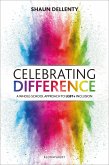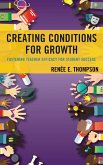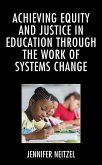Ian M. Mette, Dwayne Ray Cormier, Yanira Oliveras
Making a Difference (eBook, PDF)
Instructional Leadership That Drives Self-Reflection and Values the Expertise of Teachers
16,95 €
16,95 €
inkl. MwSt.
Sofort per Download lieferbar

8 °P sammeln
16,95 €
Als Download kaufen

16,95 €
inkl. MwSt.
Sofort per Download lieferbar

8 °P sammeln
Jetzt verschenken
Alle Infos zum eBook verschenken
16,95 €
inkl. MwSt.
Sofort per Download lieferbar
Alle Infos zum eBook verschenken

8 °P sammeln
Ian M. Mette, Dwayne Ray Cormier, Yanira Oliveras
Making a Difference (eBook, PDF)
Instructional Leadership That Drives Self-Reflection and Values the Expertise of Teachers
- Format: PDF
- Merkliste
- Auf die Merkliste
- Bewerten Bewerten
- Teilen
- Produkt teilen
- Produkterinnerung
- Produkterinnerung

Bitte loggen Sie sich zunächst in Ihr Kundenkonto ein oder registrieren Sie sich bei
bücher.de, um das eBook-Abo tolino select nutzen zu können.
Hier können Sie sich einloggen
Hier können Sie sich einloggen
Sie sind bereits eingeloggt. Klicken Sie auf 2. tolino select Abo, um fortzufahren.

Bitte loggen Sie sich zunächst in Ihr Kundenkonto ein oder registrieren Sie sich bei bücher.de, um das eBook-Abo tolino select nutzen zu können.
Making A Difference aims to equip educators with a framework for providing instructional leadership that ensures culturally responsive instruction. Changing what is taught, how it is taught, and who it is intended for is one of the most effective ways of contributing to a more progressive, equitable, and inclusive society. This requires instructional leaders to mitigate harmful educational practices from prepackaged curricula and teacher evaluation systems. Through specific structures, schools can support teachers to become culturally responsive instructors through formative feedback…mehr
- Geräte: PC
- mit Kopierschutz
- eBook Hilfe
- Größe: 1.72MB
Andere Kunden interessierten sich auch für
![Making a Difference (eBook, ePUB) Making a Difference (eBook, ePUB)]() Ian M. MetteMaking a Difference (eBook, ePUB)16,95 €
Ian M. MetteMaking a Difference (eBook, ePUB)16,95 €![Celebrating Difference (eBook, PDF) Celebrating Difference (eBook, PDF)]() Shaun DellentyCelebrating Difference (eBook, PDF)16,95 €
Shaun DellentyCelebrating Difference (eBook, PDF)16,95 €![Implications of Race and Racism in Student Evaluations of Teaching (eBook, PDF) Implications of Race and Racism in Student Evaluations of Teaching (eBook, PDF)]() Implications of Race and Racism in Student Evaluations of Teaching (eBook, PDF)25,95 €
Implications of Race and Racism in Student Evaluations of Teaching (eBook, PDF)25,95 €![Creating Conditions for Growth (eBook, PDF) Creating Conditions for Growth (eBook, PDF)]() Renée E. ThompsonCreating Conditions for Growth (eBook, PDF)28,95 €
Renée E. ThompsonCreating Conditions for Growth (eBook, PDF)28,95 €![Promoting Educational Success through Culturally Situated Instruction (eBook, PDF) Promoting Educational Success through Culturally Situated Instruction (eBook, PDF)]() Promoting Educational Success through Culturally Situated Instruction (eBook, PDF)65,95 €
Promoting Educational Success through Culturally Situated Instruction (eBook, PDF)65,95 €![Get an Internship and Make the Most of It (eBook, PDF) Get an Internship and Make the Most of It (eBook, PDF)]() Joan E. MclachlanGet an Internship and Make the Most of It (eBook, PDF)19,95 €
Joan E. MclachlanGet an Internship and Make the Most of It (eBook, PDF)19,95 €![Achieving Equity and Justice in Education through the Work of Systems Change (eBook, PDF) Achieving Equity and Justice in Education through the Work of Systems Change (eBook, PDF)]() Jennifer NeitzelAchieving Equity and Justice in Education through the Work of Systems Change (eBook, PDF)26,95 €
Jennifer NeitzelAchieving Equity and Justice in Education through the Work of Systems Change (eBook, PDF)26,95 €-
-
-
Making A Difference aims to equip educators with a framework for providing instructional leadership that ensures culturally responsive instruction. Changing what is taught, how it is taught, and who it is intended for is one of the most effective ways of contributing to a more progressive, equitable, and inclusive society. This requires instructional leaders to mitigate harmful educational practices from prepackaged curricula and teacher evaluation systems. Through specific structures, schools can support teachers to become culturally responsive instructors through formative feedback structures that can transform schools from systems of oppression into systems of opportunity.
Produktdetails
- Produktdetails
- Verlag: Bloomsbury eBooks US
- Seitenzahl: 152
- Erscheinungstermin: 22. September 2023
- Englisch
- ISBN-13: 9798765175163
- Artikelnr.: 74626751
- Verlag: Bloomsbury eBooks US
- Seitenzahl: 152
- Erscheinungstermin: 22. September 2023
- Englisch
- ISBN-13: 9798765175163
- Artikelnr.: 74626751
- Herstellerkennzeichnung Die Herstellerinformationen sind derzeit nicht verfügbar.
Ian M. Mette is an Associate Professor of Educational Leadership where he focuses his interests on the development of culturally responsive instructional supervision and developing equity-minded school leaders in predominantly White rural spaces. Specifically, his work targets closing the gap between theory and practice to inform and support equitable school improvement efforts for all students
Contents
Prologue
Preface
Acknowledgments
IntroductionThe Instructional Leader as an Equity Leader
To whom and what are we most accountable?Why leadership is crucial to the
conversationWhy we need culturally responsive instructional supervision
nowHow developing empathy can make our communities betterLearning to stand
up to hatred
Part IAddressing the Feedback Loop Problem in US Schools
Chapter 2Shifting Feedback from Hierarchical to Helpful
Shifting away from plantation practicesReexamining the purpose of feedback
about instructionUtilizing ongoing conversations to cocreate knowledge and
promote authentic accountabilityLeveraging relational trust to promote more
inclusive instruction
Chapter 3Liberating Ourselves from Prepackaged Systems
Why moving beyond the checklist is so importantHow templates prevent
critical thinkingLearning to create feedback practices that are immediately
usefulDeveloping common language and assumptions about learning Meeting
policy requirements through pedagogies that lead to equitable outcomes
Chapter 4Learning to Engage in a Community of Culturally Responsive
Instructors (CCRI)
Considering the role of data in acts of educational resistanceWhy autonomy
is at the heart of inclusive instructionHow critical colleagues can
collaborate for co-liberationSharing learning as a form of love across a
school cultureQuestioning power structures to address systemic inequityThe
challenges of moving forward with the work
Part IIDeveloping a Team of Inclusive Instructional Leaders
Chapter 5Being Intentional about Representation
Why representation mattersShifting away from racial and sexual
contractsOther sociocultural identities to considerDetermining how
'instructional success' is measuredThe goal is not to maintain
comfortablenessBeing clear about steps for success
Chapter 6Working Together to Determine What Culturally Responsive
Instructional Supervision Looks Like
Determining goals for walkthroughsWhat does equity data look like in a
walkthrough?How ongoing instructional reflections inform practiceThe
process of examining walkthrough dataUsing data to drive professional
development efforts
Chapter 7Establishing A Plan of Action When Instruction is Not Inclusive
Defining what teaching looks like that lacks cultural
responsivenessDetermining feedback and support structures to addresses
problematic pedagogiesFurther developing reflective and inclusive
instructionSeeing criticality as a tool for emancipationDeveloping the
scaffolding for transformation
Part III Supporting Ongoing Growth and Development of Culturally Responsive
Instruction
Chapter 8Growth Starts with the Self
Using agency to address the purpose of educationOwning content
expertiseLearning to address the needs of society over our own
comfortKnowing pedagogical look-fors when reflecting on teaching
Chapter 9Learning to Grow with Critical Colleagues
How critical colleagues help to better understand the self and othersTopics
of discussion for critical colleague groupsBeing purposeful with
discussions to drive difficult growth edgesUsing every group conversation
as an opportunity to discuss equity
Chapter 10Using Peer-Led Classroom Observations to Drive Equitable Outcomes
How peer walkthroughs can help calibrate building-wide expectationsUsing
peer feedback to inform inquiry cyclesTransforming feedback to deconstruct
systems of inequityAllowing instructional improvement efforts to evolved
over time for more equitable outcomes
ConclusionSignaling a Shift in Where We Must Go
Resisting technorational approaches to improving instruction Using
supervision to support a system of opportunity Honoring 'getting into good
trouble'A closing note to practitioner
Prologue
Preface
Acknowledgments
IntroductionThe Instructional Leader as an Equity Leader
To whom and what are we most accountable?Why leadership is crucial to the
conversationWhy we need culturally responsive instructional supervision
nowHow developing empathy can make our communities betterLearning to stand
up to hatred
Part IAddressing the Feedback Loop Problem in US Schools
Chapter 2Shifting Feedback from Hierarchical to Helpful
Shifting away from plantation practicesReexamining the purpose of feedback
about instructionUtilizing ongoing conversations to cocreate knowledge and
promote authentic accountabilityLeveraging relational trust to promote more
inclusive instruction
Chapter 3Liberating Ourselves from Prepackaged Systems
Why moving beyond the checklist is so importantHow templates prevent
critical thinkingLearning to create feedback practices that are immediately
usefulDeveloping common language and assumptions about learning Meeting
policy requirements through pedagogies that lead to equitable outcomes
Chapter 4Learning to Engage in a Community of Culturally Responsive
Instructors (CCRI)
Considering the role of data in acts of educational resistanceWhy autonomy
is at the heart of inclusive instructionHow critical colleagues can
collaborate for co-liberationSharing learning as a form of love across a
school cultureQuestioning power structures to address systemic inequityThe
challenges of moving forward with the work
Part IIDeveloping a Team of Inclusive Instructional Leaders
Chapter 5Being Intentional about Representation
Why representation mattersShifting away from racial and sexual
contractsOther sociocultural identities to considerDetermining how
'instructional success' is measuredThe goal is not to maintain
comfortablenessBeing clear about steps for success
Chapter 6Working Together to Determine What Culturally Responsive
Instructional Supervision Looks Like
Determining goals for walkthroughsWhat does equity data look like in a
walkthrough?How ongoing instructional reflections inform practiceThe
process of examining walkthrough dataUsing data to drive professional
development efforts
Chapter 7Establishing A Plan of Action When Instruction is Not Inclusive
Defining what teaching looks like that lacks cultural
responsivenessDetermining feedback and support structures to addresses
problematic pedagogiesFurther developing reflective and inclusive
instructionSeeing criticality as a tool for emancipationDeveloping the
scaffolding for transformation
Part III Supporting Ongoing Growth and Development of Culturally Responsive
Instruction
Chapter 8Growth Starts with the Self
Using agency to address the purpose of educationOwning content
expertiseLearning to address the needs of society over our own
comfortKnowing pedagogical look-fors when reflecting on teaching
Chapter 9Learning to Grow with Critical Colleagues
How critical colleagues help to better understand the self and othersTopics
of discussion for critical colleague groupsBeing purposeful with
discussions to drive difficult growth edgesUsing every group conversation
as an opportunity to discuss equity
Chapter 10Using Peer-Led Classroom Observations to Drive Equitable Outcomes
How peer walkthroughs can help calibrate building-wide expectationsUsing
peer feedback to inform inquiry cyclesTransforming feedback to deconstruct
systems of inequityAllowing instructional improvement efforts to evolved
over time for more equitable outcomes
ConclusionSignaling a Shift in Where We Must Go
Resisting technorational approaches to improving instruction Using
supervision to support a system of opportunity Honoring 'getting into good
trouble'A closing note to practitioner
Contents
Prologue
Preface
Acknowledgments
IntroductionThe Instructional Leader as an Equity Leader
To whom and what are we most accountable?Why leadership is crucial to the
conversationWhy we need culturally responsive instructional supervision
nowHow developing empathy can make our communities betterLearning to stand
up to hatred
Part IAddressing the Feedback Loop Problem in US Schools
Chapter 2Shifting Feedback from Hierarchical to Helpful
Shifting away from plantation practicesReexamining the purpose of feedback
about instructionUtilizing ongoing conversations to cocreate knowledge and
promote authentic accountabilityLeveraging relational trust to promote more
inclusive instruction
Chapter 3Liberating Ourselves from Prepackaged Systems
Why moving beyond the checklist is so importantHow templates prevent
critical thinkingLearning to create feedback practices that are immediately
usefulDeveloping common language and assumptions about learning Meeting
policy requirements through pedagogies that lead to equitable outcomes
Chapter 4Learning to Engage in a Community of Culturally Responsive
Instructors (CCRI)
Considering the role of data in acts of educational resistanceWhy autonomy
is at the heart of inclusive instructionHow critical colleagues can
collaborate for co-liberationSharing learning as a form of love across a
school cultureQuestioning power structures to address systemic inequityThe
challenges of moving forward with the work
Part IIDeveloping a Team of Inclusive Instructional Leaders
Chapter 5Being Intentional about Representation
Why representation mattersShifting away from racial and sexual
contractsOther sociocultural identities to considerDetermining how
'instructional success' is measuredThe goal is not to maintain
comfortablenessBeing clear about steps for success
Chapter 6Working Together to Determine What Culturally Responsive
Instructional Supervision Looks Like
Determining goals for walkthroughsWhat does equity data look like in a
walkthrough?How ongoing instructional reflections inform practiceThe
process of examining walkthrough dataUsing data to drive professional
development efforts
Chapter 7Establishing A Plan of Action When Instruction is Not Inclusive
Defining what teaching looks like that lacks cultural
responsivenessDetermining feedback and support structures to addresses
problematic pedagogiesFurther developing reflective and inclusive
instructionSeeing criticality as a tool for emancipationDeveloping the
scaffolding for transformation
Part III Supporting Ongoing Growth and Development of Culturally Responsive
Instruction
Chapter 8Growth Starts with the Self
Using agency to address the purpose of educationOwning content
expertiseLearning to address the needs of society over our own
comfortKnowing pedagogical look-fors when reflecting on teaching
Chapter 9Learning to Grow with Critical Colleagues
How critical colleagues help to better understand the self and othersTopics
of discussion for critical colleague groupsBeing purposeful with
discussions to drive difficult growth edgesUsing every group conversation
as an opportunity to discuss equity
Chapter 10Using Peer-Led Classroom Observations to Drive Equitable Outcomes
How peer walkthroughs can help calibrate building-wide expectationsUsing
peer feedback to inform inquiry cyclesTransforming feedback to deconstruct
systems of inequityAllowing instructional improvement efforts to evolved
over time for more equitable outcomes
ConclusionSignaling a Shift in Where We Must Go
Resisting technorational approaches to improving instruction Using
supervision to support a system of opportunity Honoring 'getting into good
trouble'A closing note to practitioner
Prologue
Preface
Acknowledgments
IntroductionThe Instructional Leader as an Equity Leader
To whom and what are we most accountable?Why leadership is crucial to the
conversationWhy we need culturally responsive instructional supervision
nowHow developing empathy can make our communities betterLearning to stand
up to hatred
Part IAddressing the Feedback Loop Problem in US Schools
Chapter 2Shifting Feedback from Hierarchical to Helpful
Shifting away from plantation practicesReexamining the purpose of feedback
about instructionUtilizing ongoing conversations to cocreate knowledge and
promote authentic accountabilityLeveraging relational trust to promote more
inclusive instruction
Chapter 3Liberating Ourselves from Prepackaged Systems
Why moving beyond the checklist is so importantHow templates prevent
critical thinkingLearning to create feedback practices that are immediately
usefulDeveloping common language and assumptions about learning Meeting
policy requirements through pedagogies that lead to equitable outcomes
Chapter 4Learning to Engage in a Community of Culturally Responsive
Instructors (CCRI)
Considering the role of data in acts of educational resistanceWhy autonomy
is at the heart of inclusive instructionHow critical colleagues can
collaborate for co-liberationSharing learning as a form of love across a
school cultureQuestioning power structures to address systemic inequityThe
challenges of moving forward with the work
Part IIDeveloping a Team of Inclusive Instructional Leaders
Chapter 5Being Intentional about Representation
Why representation mattersShifting away from racial and sexual
contractsOther sociocultural identities to considerDetermining how
'instructional success' is measuredThe goal is not to maintain
comfortablenessBeing clear about steps for success
Chapter 6Working Together to Determine What Culturally Responsive
Instructional Supervision Looks Like
Determining goals for walkthroughsWhat does equity data look like in a
walkthrough?How ongoing instructional reflections inform practiceThe
process of examining walkthrough dataUsing data to drive professional
development efforts
Chapter 7Establishing A Plan of Action When Instruction is Not Inclusive
Defining what teaching looks like that lacks cultural
responsivenessDetermining feedback and support structures to addresses
problematic pedagogiesFurther developing reflective and inclusive
instructionSeeing criticality as a tool for emancipationDeveloping the
scaffolding for transformation
Part III Supporting Ongoing Growth and Development of Culturally Responsive
Instruction
Chapter 8Growth Starts with the Self
Using agency to address the purpose of educationOwning content
expertiseLearning to address the needs of society over our own
comfortKnowing pedagogical look-fors when reflecting on teaching
Chapter 9Learning to Grow with Critical Colleagues
How critical colleagues help to better understand the self and othersTopics
of discussion for critical colleague groupsBeing purposeful with
discussions to drive difficult growth edgesUsing every group conversation
as an opportunity to discuss equity
Chapter 10Using Peer-Led Classroom Observations to Drive Equitable Outcomes
How peer walkthroughs can help calibrate building-wide expectationsUsing
peer feedback to inform inquiry cyclesTransforming feedback to deconstruct
systems of inequityAllowing instructional improvement efforts to evolved
over time for more equitable outcomes
ConclusionSignaling a Shift in Where We Must Go
Resisting technorational approaches to improving instruction Using
supervision to support a system of opportunity Honoring 'getting into good
trouble'A closing note to practitioner







